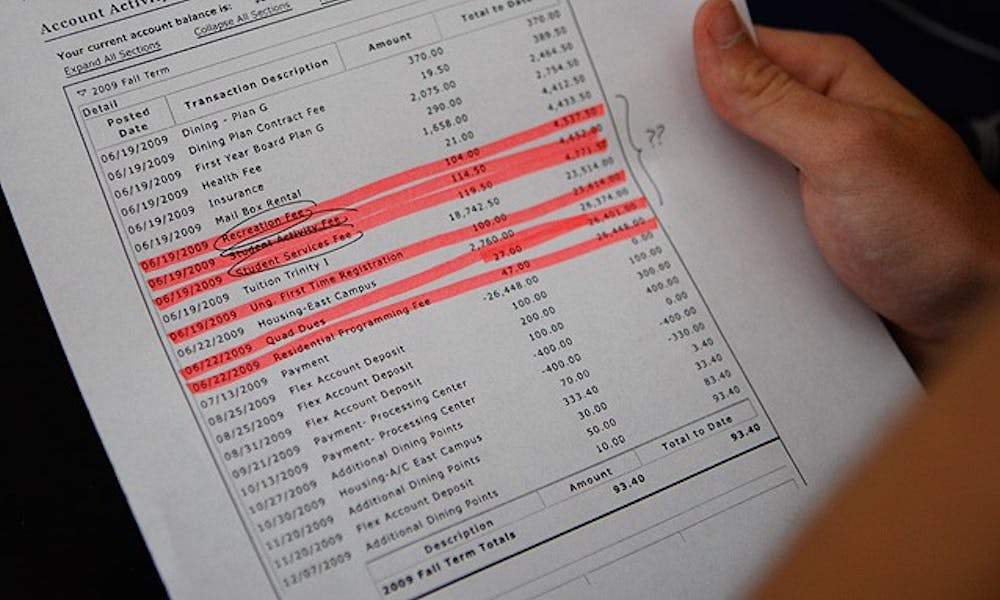Each year, Duke undergraduates spend a little more than $50,000 each for tuition, room, board and a higher education.
Not only does this sum lead to a diploma, but it also pays for several other on-campus opportunities that students might not know they are helping to fund. For 2010-2011, undergraduates living on campus will pay about $379 each in fees for various on-campus programs developed by Duke Student Government, Campus Council, Duke University Union, class councils, resident advisors and quadrangle councils.
In total, this amounts to about $1,368 over the course of an undergraduate’s career for students who live in a quad on campus for three years.
“[Groups] have all this money for open events,” said Max Tabachnik, a rising senior and chair of DSG’s Student Organization Finance Committee, which distributes money to all student groups on campus. “I would recommend if you want to get your bang for your buck, go out, join groups but also go to a lot of events.”
A student’s total contribution over four years is divided into three categories on student bursar accounts. For the Fall 2010 semester, the student activities fee is $115.50, quad dues are $27 and residential programming fees are $47.
The student activities fee is split between DSG, DUU, funding for the Last Day of Classes celebration and class councils, said Vice President for Student Affairs Larry Moneta. A large portion of the student activities fee goes to SOFC. Tabachnik said SOFC provides funding for a variety of events on campus which are open to all undergraduates. In recent years, SOFC has directed funds toward Awaaz and Springternational, among others. Additionally, SOFC pays for student group events including retreats and conferences.
DSG itself receives one of the larger grants from SOFC for other student services and projects. DSG’s Readership Program and its bus tracking system, projected to be implemeted this Fall, are among some of the projects DSG has paid for, said DSG President Mike Lefevre, a rising senior.
“Everything we do is supposed to be a student service,” Lefevre said. “[The projects] use student money because it comes right back to students.”
Much of students’ money goes toward campus-wide events. Most of DUU’s funding goes toward funding concerts, like this Spring’s Cameron Rocks which featured N.E.R.D. and Kid Cudi, and other events that are open to all undergraduates. Class councils, which pay for events for each class, also receive funding from the student activities fee through DSG. Class councils pay for annual events such as Midnight Breakfast and other non-traditional events suggested by individual students.
“We tend to fund [events] that revolve around East Campus and the Freshman class,” said rising sophomore Matt Truwit, former president of East Campus Council.
Students will pay more in fees if they spend their four years on East and West campuses, where they will pay quad dues each semester. Quad dues and the residential programming fee are shared on one side by resident advisors, quad and house councils and on the other by Campus Council, said Joe Gonzalez, associate dean for residential life. Students in Central Campus and off campus do not pay quad dues.
“The theory is that each student should benefit very directly from their portion of the fee because their residential area should have a number of events,” Gonzalez said.
The house and quad councils are required to have eight events per semester that are a mix of community outreach, cultural and faculty interaction, housekeeping appreciation and quad-centric activity, according to a Campus Council bylaw.
“The ones that are definitely the most popular are the ones that [have] free food,” said rising senior Connor Bevans, outgoing president of Wannamaker Quad Council.
The quad and house councils receive their funding from Campus Council, which ensures they use their funding according to guidelines.
“Every penny of [our budget] goes back to students in one form or another,” said Campus Council President Stephen Temple, a rising senior. “That’s the driving force behind this—how can we benefit.”
Temple said the Council tries to fund some unique events that might not otherwise take place, but also gives a portion of its funding to bigger events like LDOC. He also said Campus Council provides funding for individual student projects.
“I would encourage students to attend events, apply to the CC finance committee to put on their own events and become active in their house or quad council so that they can influence how the funds [from student fees] are used,” Temple said.
If students become involved on campus, they are more likely to see the direct results of their fees, Tabachnik said.
“Talk to people, see what’s going on, check your calendar and go out there,” Tabachnik said. “That’s when you’ll get the Duke experience.”
Get The Chronicle straight to your inbox
Sign up for our weekly newsletter. Cancel at any time.

